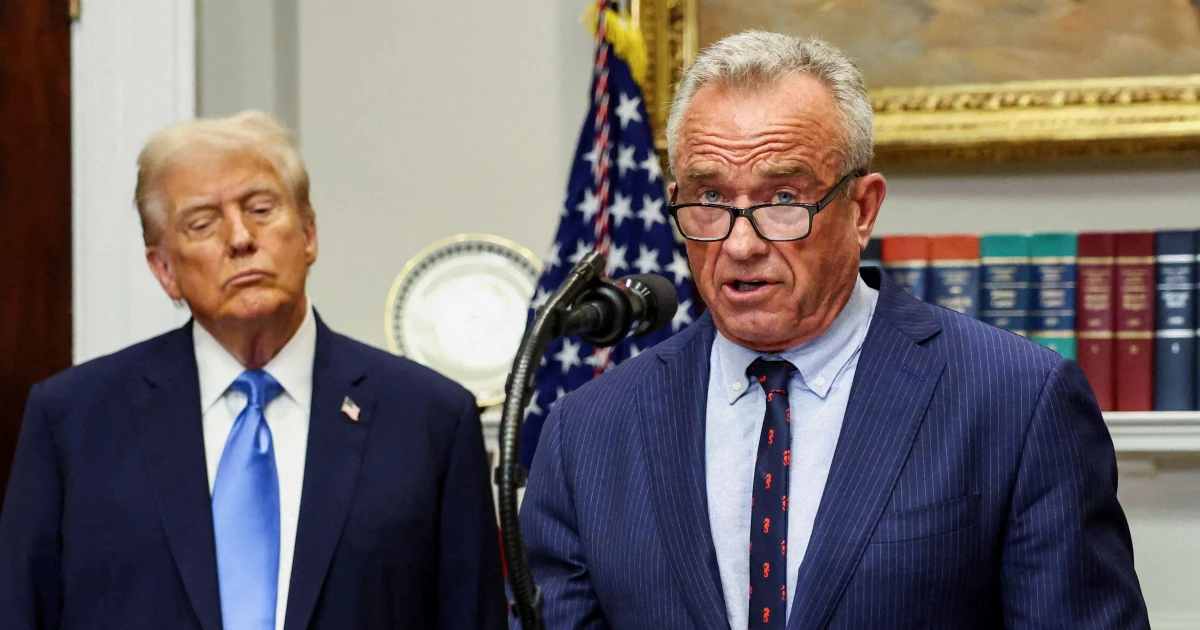
The Trump administration is hailing a medication called leucovorin for reducing some autism symptoms, but experts who research or treat autism almost uniformly agree the medication should be studied further before it’s rolled out to children or adults.
Leucovorin, also referred to as folinic aid, is a synthetic form of vitamin B9 that requires a prescription. It’s often administered to cancer patients alongside chemotherapy in the form of an IV.
The Food and Drug Administration announced Monday that it’s in the process of approving a tablet version for certain autism patients.
Many researchers questioned whether the approval was premature, given that only a handful of small trials — mostly conducted outside the U.S. — have pointed to leucovorin being effective in children with autism.
Several experts told NBC News that the FDA’s approval could give false hope to families, since not all children with autism may qualify for a prescription and, even if they do, the likelihood of seeing results is uncertain.
Scientists have searched for decades for a drug that can meaningfully reduce autism symptoms, but few have met the rigorous threshold for safety and effectiveness that’s typically set by the FDA. Before Monday, the agency had approved two drugs to treat irritability associated with autism, but none that addressed autism-related communication difficulties, social challenges or repetitive behaviors.
“It’s not like scientists have just been staring at their belly buttons for 20 years, not looking at autism treatments. They have, but the standards have been very high to get it approved,” said Alycia Halladay, chief science officer at the Autism Science Foundation. Her organization, which funds evidence-based autism research, does not recommend leucovorin as a treatment and says more studies are needed.
Leucovorin “doesn’t have the criteria to meet FDA approval, but yet this administration is just doing it anyway. So I wouldn’t exactly call this a win,” Halladay said.
She added that the way the medication was touted at a White House briefing on Monday — as a breakthrough for autism families — doesn’t reflect the details of the FDA’s approval.
The FDA said in a news release that the drug is being approved for patients with cerebral folate deficiency, a rare neurological condition characterized by low levels of vitamin B9 (folate) in the brain. Some researchers suspect the condition is associated with autism, though not all autism patients have it.
(Halladay estimated around 10-30% of autism patients have the condition.)
Leucovorin can help folate reach the brain, which in theory might improve verbal communication or reduce autism symptoms like irritability or repetitive behaviors. But there’s no evidence that it eliminates symptoms altogether.
“I still remain hopeful that leucovorin may be a tool in our toolbox that can help a group of patients,” said Dr. Rachel Follmer, an assistant professor of pediatrics at Northwestern University Feinberg School of Medicine. “But I don’t know if we’re at the point yet where we can say that this is definitely going to help all individuals with autism.”
President Donald Trump said at the briefing that the approval “gives hope to the many parents with autistic children that it may be possible to improve their lives.” Mehmet Oz, administrator of the Centers for Medicare and Medicaid Services, called the action “life-saving.” And FDA Commissioner Marty Makary estimated that “hundreds of thousands of kids, in my opinion, will benefit.”
However, in a news release following the briefing, the Department of Health and Human Services said leucovorin “is not a cure” for autism and “may only lead to improvements in speech-related deficits for a subset of children.”
David Mandell, a psychiatry professor at the University of Pennsylvania, said the folate hypothesis is based on relatively weak science.
“We do not have good, large-scale studies that show that any significant portion of autistic people have a folate deficiency,” he said.
Leucovorin has been shown to have relatively minimal side effects in cancer patients, though high doses can cause gastrointestinal problems or increase the risk of seizures in people taking anti-seizure medications. It’s part of a common regimen for colorectal and other gastrointestinal cancers, where it’s used to intensify the effect of the chemotherapy drug 5-fluorouracil. In rarer cases, it’s used to mitigate the side effects of another chemo drug called high-dose methotrexate.
Halladay said leucovorin trials for autism looked at side effects, but didn’t specifically evaluate the medication’s safety. Dosages also differed from study to study, she said, and some trial participants received behavioral therapy, making it hard to determine if leucovorin was responsible for improving their symptoms.
Mandell said the largest of those trials had 80 participants — too small to produce definitive results.
“If you were looking for an FDA approval, for example, you’d want hundreds of kids in these trials,” he said.
Leucovorin must clear a final hurdle before it’s available to some autism patients. The FDA said it is working with GSK, the maker of the brand name version of leucovorin, to update the drug’s label. GSK said in a statement that a drug application still needs to be submitted to include the new indication for autism.
Oz said Monday that leucovorin prescriptions will be covered by Medicaid and that private insurance companies are likely to follow suit.
But Mandell said he worries that anticipated cuts to Medicaid could force many families to pay out of pocket, and drive some to purchase folinic acid supplements online without a prescription. Online supplements are less likely to have been quality tested and it can be hard to confirm what dosage they contain.
Dr. William Dahut, chief scientific officer of the American Cancer Society, said it’s possible that interest in leucovorin for autism could also impact the drug’s availability for cancer patients.
“We have seen shortages of this drug in the past, and if there is increased interest, shortages may occur in the future,” he said in an email.



